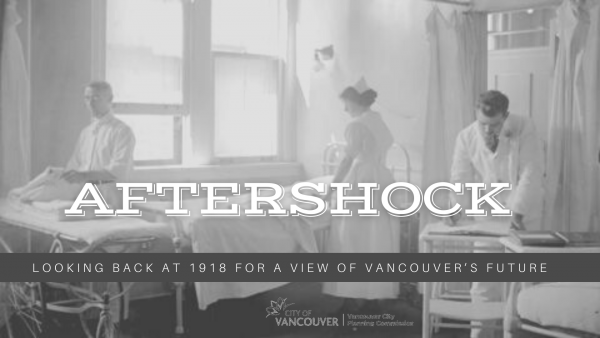
Event Details
Date: October 27, 2020
Time: 7:00-8:30-pm
Via: Zoom
Event Description
The first victim in Vancouver of the 1918 influenza epidemic—Annie Sachs—a mother of three young children – died on October 8, 1918. By October 27, 1918, 24 people in Vancouver died in a single day. Before the disease’s fury was spent, almost one per cent of Vancouver’s population had died.
In the following decade, Vancouver underwent extraordinary changes in urban planning, design and architecture as World War One ended, the economy shuddered, protests filled the streets and cities re-invented themselves.
A century later, Vancouver is once again grappling with the effects of a pandemic. The boundaries between past and present begin to blur when we look closely at what happened in 1918 and where we are now.
Linking the past to our future, the Vancouver City Planning Commission’s Chronology Project is holding a panel discussion 102 years after that heartbreaking day when the virus claimed so many lives – October 27, 2020 – to explore how the 1918 influenza changed Vancouver and whether we should anticipate similar changes in the months and years ahead. The panel is part of a VCPC series of discussions on the post-pandemic city.
The panel with consider issues such as :
- What lessons learned during and after the Influenza epidemic can help inform our responses to COVID-19?
- How did city building, architecture and urban design of Vancouver changed after the 1918 influenza epidemic? and,
- How did the 1918 pandemic affected Indigenous, Black, Chinese, and Indo-Canadian communities? Are these communities are experiencing similar impacts today during the COVID-19 pandemic.
Panel
Panelists will include:
Mary Rowe, President and CEO of the Canadian Urban Institute. An impassioned civic leader with diverse experience in the business, government, not-for-profit and philanthropy sectors in Canada and the US for over 30 years, Mary has been a steady advocate and champion for place-based approaches to building livable and resilient cities, and community-driven local economies. In her role at the CUI, Mary has spearheaded a number of COVID-19 Initiatives that offer important conversations, analysis, commentary , and guidance on the new urban reality under COVID-19.
Dr. Kelley Lee is a Canada Research Chair Tier I Professor of Public Health at Simon Fraser University. She has studied the impact of globalization on public health. In 2018 she was selected by the Canadian Society for International Health as one of the leading women in global health. During the COVID-19 pandemic Dr. Lee is studying effective ways to mitigate the spread of the virus in an effort to design evidence-based public health strategies.
John Atkin is a civic historian, author and heritage consultant who has explored Vancouver like few others. Through his research, writing, walking-tours and advocacy, he offers an often offbeat but always prescient insights on urban planning and development, a love of architecture, and brings the fascination of the curious to all his work.
Additional panelists and moderator to be confirmed.
Moderator
Uytae Lee produces videos that educate and engage the public on urban planning issues. His background in urban planning paired with his experience in journalism, music, and videography provides him with a unique perspective on communicating the complex issues surrounding our cities.
In 2013, he founded PLANifax, a non-profit organization dedicated to educating the public on urban planning issues in Halifax through video. He later went on to support diverse organizations to create engaging content on a wide array of urban planning issues. His past clients include The City of Vancouver, the Halifax Regional Municipality, the BC Council for International Co-operation, Halifax Water, and much much more.
Uytae currently produces a video column with CBC Vancouver called About Here where he challenges viewers to ‘rethink’ their city.
Additional Information
Closed captioning will be available,

